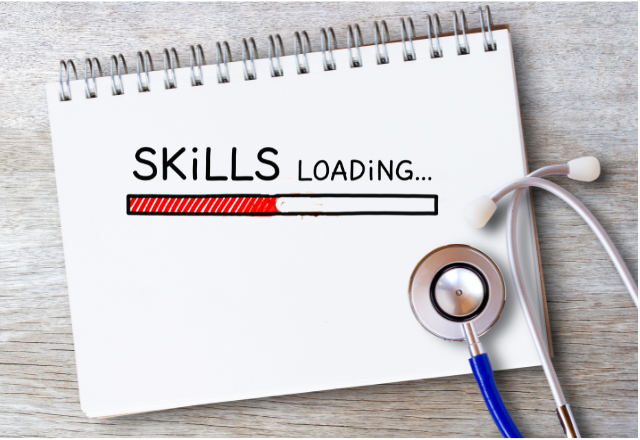

The word resilience is discussed and thrown around a lot, but what does it truly mean and why is it important?
The American Psychological Association defines resilience as “the process and outcome of successfully adapting to difficult or challenging life experiences, especially through mental, emotional, and behavioral flexibility and adjustment to external and internal demands.”
After working diligently as a pre-PA, surviving PA school, and working as a PA-C, I believe resilience to be essential. It is the learned skill to acknowledge a mistake and grow from it. It is the ability to experience a difficult interaction with a preceptor, patient, or anyone else in our life and demonstrate the strength to learn. Mistakes, bad days, challenges, and difficult interactions do not define who we are, but offer a gigantic opportunity to become better. We will not be perfect and will face various challenges throughout our lives.
I believe in order to truly thrive in the healthcare field and in all stages of preparation to becoming a PA-C, the practice and building of resilience must be learned, practiced, and practiced again. It is no secret that burnout and emotional strain occur to the best of us as higher patient loads wrought the medical field. However, resilience is a major piece of the armor we can build and fortify in order to insulate us. The skill of resilience is within our control in order to thrive throughout our PA journey from pre-PA through PA-C.
So how do we do this?
First step is to try to reframe what we would consider “failures” and “setbacks.” Let’s look at a pre-PA example.
The average pre-PA applies to programs multiple times before ultimate acceptance. Admission rates to top programs like Duke University sit around 6% and Baylor University as well as Emory University around 3%. Not receiving an interview or acceptance into a program is very disappointing. You dedicate hours of schooling, volunteering, working, and put your heart and soul into the process.
If you do not receive an interview or acceptance, it may be easy to give up. However, this intersection presents a critical choice. Concede and take it as a sign that you are never supposed to be a PA or dig in and get more help. At this point, you possess the opportunity to contact schools to gain feedback about your application, retake classes with low grades to demonstrate your current abilities as a student, find ways to illustrate your growth as an applicant through patient care hours, or work with someone to improve your application. Acknowledging the disappointment, learning from it, and returning to apply again both exhibits and fortifies resilience. Being a reapplicant can actually be seen as a strength by an admissions committee.
Additionally, one pre-PA reapplicant acknowledged that when she applied to PA school in the past, she was not ready in regard to maturity and stability in her life as compared to when she was ultimately accepted. She found gratitude in the deferment of her ultimate PA school admission and went on to excel as a PA student.
Second step is to support your own mental health. This may seem obvious or simple, but it is absolutely essential. As a medical professional, we spend our days caring for others, which is wonderful and why we pursue this career. However, as they always say on a plane, “put your own oxygen mask on before helping others.”
How can we give to our patient’s if we are not taking care of ourselves?
This care will take on different forms for everyone and may include:
Let’s discuss an example:
It is well known that PA school tends to push most people to their max and sometimes beyond what they ever thought possible. Who knew you could learn all about the heart in four weeks or the anatomy of the body in four months? But, you do and you survive.
In the midst of this exciting journey, I hear many PA students discuss the mental and sometimes emotional strain they experience. If you can dig deep to reframe the difficult experience while learning to become flexible and adaptable, you will develop the resilience to reframe the challenges and suffering into one of growth enabling you to become the provider you want caring for your loved ones and who you dreamt of being.
A third evidence-based step in developing and boosting resilience is a concrete daily habit that can powerfully transform your mental outlook – practicing gratitude.
Researchers Robert Emmons and Michael McCullough state “(g)ratitude is associated with a personal benefit that was not intentionally sought after, deserved, or earned but rather because of the good intensions of another person.”
The idea of gratitude is great, but we must do more than just think about it to reap the benefits. While you don’t have to share your deepest thoughts with anyone, numerous research studies demonstrate the essential act of writing down these words by keeping a Gratitude Journal. This may sound silly, but this act helps to solidify new connections in the brain. Turning this action into habit is associated with relieving depression, coping with stress, and decreasing physical pain. What’s even better, keeping a Gratitude Journal is free! This daily behavior is something I prescribe to patients frequently and have seen other providers do as well with significant results.
The last step is to practice over and over again. Push yourself to courageously try something new, ask for feedback from friends, supervising physicians, patients, and more. Try stepping outside of your comfort zone. While all of these steps will help you to build resilience, you will simultaneously build confidence in your abilities to work through disappointment and challenges that will pop up throughout our personal and work lives.
As C.S. Lewis said, “Hardships often prepare ordinary people for an extraordinary destiny.”
Go out there and be an extraordinary PA!
Articles:
© 2025 All Rights Reserved.